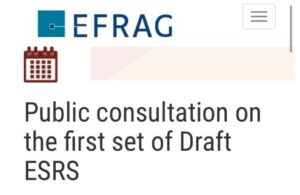
EFRAG announces its public consultation on the EDs of the Draft ESRS with a deadline of 8 August and invites all stakeholders to provide comments on the Draft ESRS through the consultation survey. The proposal for a Corporate Sustainability Reporting Directive (CSRD) identifies EFRAG as technical advisor to the European Commission providing draft European Sustainability Reporting Standards (‘ESRS’). EFRAG was requested by Commissioner McGuinness in May 2021 to put in place interim working methods in project mode to start the technical development of these draft standards immediately, in parallel to the legislative process of the CSRD. This work was undertaken by the Project Task Force on European sustainability reporting standards (PTF-ESRS) to be handed over to the EFRAG permanent structure when in place The PTF-ESRS transmitted its proposed public consultation package including the first set of EDs to the EFRAG Sustainability Reporting Board on 27 April 2022. Today, EFRAG publishes these EDs prepared under the sole responsibility of the PTF-ESRS for public consultation for a period of 100 days ending on 8 August 2022.
This procedure follows the EFRAG’s Due Process Procedures EU Sustainability Reporting Standard-Setting, which stipulate the requirements to be followed in its role as technical advisor to the European Commission in the preparation of draft ESRS. The EFRAG Administrative Board agreed to an accelerated consultation period. These EDs correspond to the first set of standards required under the proposal for a CSRD and cover environmental, social and governance matters. This set also includes cross-cutting standards. EFRAG take this occasion to thank all PTF-ESRS members and observers, EFRAG Secretariat as well as GRI, Shift and WICI acting in cooperation with the PTF-ESRS for their collaboration and valuable input to the development of the EDs.
The current public consultation is organised to receive feedback from constituents on three key aspects of the EDs:
1. The relevance of (i) the proposed architecture, (ii) the implementation of the CSRD principles and (iii) the overall content of each ED
2. The possible options for prioritising / phasing-in the implementation of the ESRS
3. The adequacy of each disclosure requirement mandated by each ED.
As such, the public consultation survey is organised in three corresponding sections that can be accessed and answered independently:
1. Overall substance of the Exposure Drafts
2. ESRS Implementation prioritisation / phasing-in
3. Adequacy of Disclosure Requirements
In order to ease the survey navigation, these 3 sections are organised in a chapter menu, as follows:
1A. Overall ESRS Exposure Drafts relevance – Architecture
1B. Overall ESRS Exposure Drafts relevance – Implementation of CSRD principles
1C. Overall ESRS Exposure Drafts relevance – Exposure Drafts content
2. ESRS implementation prioritisation / phasing-in
3A. Adequacy of Disclosure Requirements – Cross cutting standards
3B. Adequacy of Disclosure Requirements – Environmental standards
3C. Adequacy of Disclosure Requirements – Social standards
3D. Adequacy of Disclosure Requirements – Governance standards
Respondents are strongly encouraged to respond in full to sections 1 and 2. Due to the comprehensive nature of section 3, respondents are welcome to selectively choose which disclosure requirements they would like to respond to and comment on. Respondents should provide their response to the public consultation questions by using the online survey (please click here for the link to sections 1 and 2 of the public consultation, and here for the link to section 3 of the public consultation) in order for these responses to be analysed and included in the report summarising the responses and to allow EFRAG to meet the ambitious timetable. In this way, a fair and transparent consultation process can be ensured.
Comments that do not address the specific aspects covered by the questions listed in the online survey, such as general comments, may be sent in the form of comment letters, preferably by uploading the letters on the survey tool.
Access the EDs of Draft ESRS here


